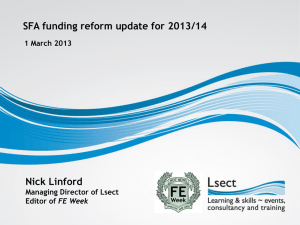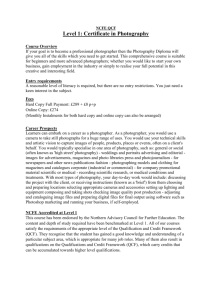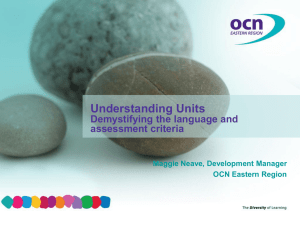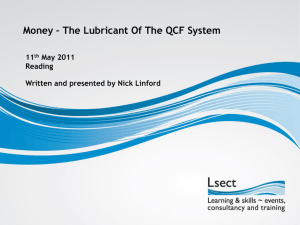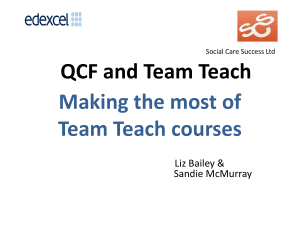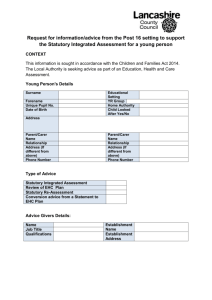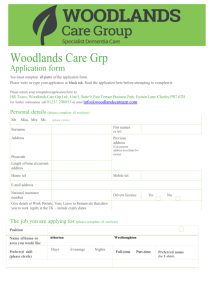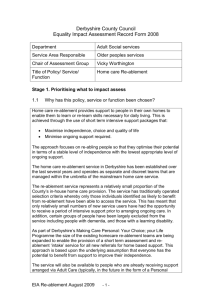Reablement Qualification and competence framework
advertisement
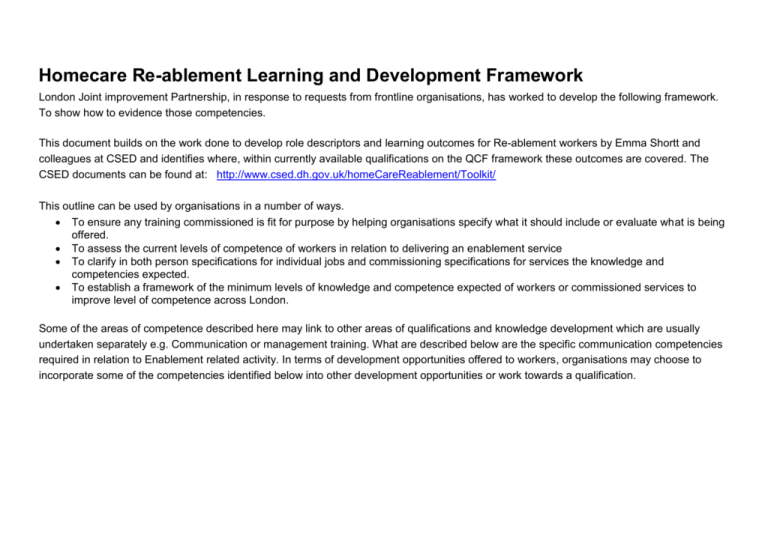
Homecare Re-ablement Learning and Development Framework London Joint improvement Partnership, in response to requests from frontline organisations, has worked to develop the following framework. To show how to evidence those competencies. This document builds on the work done to develop role descriptors and learning outcomes for Re-ablement workers by Emma Shortt and colleagues at CSED and identifies where, within currently available qualifications on the QCF framework these outcomes are covered. The CSED documents can be found at: http://www.csed.dh.gov.uk/homeCareReablement/Toolkit/ This outline can be used by organisations in a number of ways. To ensure any training commissioned is fit for purpose by helping organisations specify what it should include or evaluate what is being offered. To assess the current levels of competence of workers in relation to delivering an enablement service To clarify in both person specifications for individual jobs and commissioning specifications for services the knowledge and competencies expected. To establish a framework of the minimum levels of knowledge and competence expected of workers or commissioned services to improve level of competence across London. Some of the areas of competence described here may link to other areas of qualifications and knowledge development which are usually undertaken separately e.g. Communication or management training. What are described below are the specific communication competencies required in relation to Enablement related activity. In terms of development opportunities offered to workers, organisations may choose to incorporate some of the competencies identified below into other development opportunities or work towards a qualification. Homecare Re-ablement Learning and Development Framework Learning Outcomes (for Knowledge, Skills and Behaviours) Knowledge • • • • • • • Skills • • Behaviours Level Role Descriptors 1 Commissioners, Brokers, Colleagues working with the Re-ablement Team, e.g. health, reception • • • • • • Customer Pathway/ Personalisation What is re-ablement? How is re-ablement different to rehabilitation/ traditional homecare etc? What is a re-ablement culture? Re-ablement Plan/ Processes Dignity, choice and control Individuality, Equality & Diversity, Human Rights, Mental Capacity Privacy, Confidentiality & Data Protection How to find further info/ contacts e.g. other services, voluntary organisations, benefits How to refer How to commission Ability to adopt a re-ablement approach to own work Ability to provide high standards of customer service Effective verbal and written communications skills Ability to work as part of a multidisciplinary team and with a range of people and partners Learning materials to help meet learning outcomes • • Supporting independence – units within the QCF around (Level 2 and at other levels (e.g. – support participation in learning & development’ support independence in the tasks of daily living; Support individuals to meet personal care needs; support individuals to live at home etc Transitions: lead the management of transitions within QCF (level 5) as well as lead positive behavioural change • Commissioning, contracting and procurement NOS and also units within the QCF – need to determine level here whether to be 3,5 or 7 and specifics around skills • L&M NOS – D2 – multi disciplinary teams – establish and manage working relationships; effective procures, protocols and practices for workers based in multidisciplinary teams; opportunities for CPD for workers working within Knowledge Learning Outcomes (for Knowledge, Skills and Behaviours) • • • • • Skills Referral procedures Assessment procedures Safeguarding Voice recording procedures Learning materials to help meet learning outcomes • • • • Behaviours Level Role Descriptors 2 Call Centre, Access Team, Providers • • • • • How to complete contact referral/ assessment How to deal with difficult calls How to prepare basic reports A patient and calm approach Ability to establish facts quickly and respond logically A methodical approach to role safeguarding: QCF level 5 – safeguarding and protection of vulnerable adults competence unit; lead person centred practice as well as providing independent MCA – Dols at level 5 Safeguarding Adults Briefing and Safeguarding Adults local policies and procedures – within inductions for new staff and those going into new roles Also looking at matrix and information, advice and guidance Level Role Descriptors 3 Re-ablers and Senior Reablers Learning Outcomes (for Knowledge, Skills and Behaviours) • • • • • How people learn and basic learning skills e.g. listening, active etc How to help others learn/ coach people/ train the trainer (seniors only) H&S/ Manual Handling/ First Aid Managing risk Personal Safety and Lone Working Medical matters e.g. strokes, falls, dementia, artificial limbs, diabetes Sensory services Signs of abuse/ neglect Food hygiene and nutrition Medication (awareness of main types) • Performance Management (seniors only) • Knowledge • • • • Learning materials to help meet learning outcomes • • • • • • • • • Skills for life – would come within induction – as well as The Skills for Life and Employability Strategy and related Practical guide for social care employers and also Care Skillsbase is a resource to support managers in the adult care sector to take constructive action on communication & number skills. Coach and mentoring units : within the QCF at level 5 nutrition – within common induction standards; QCF (replacement NVQ – content within) ; as well as nutrition and wellbeing knowledge set., and the trainer toolkit to support this • Recommendations on appropriate qualifications and frequency of training refreshment is provided by the Chartered Institute of Environmental Health and the Food Standards Agency • Also units within the QCF linking to specialist areas e/f understand and meet the nutritional requirements of individuals with dementia Medication: units within the QCF – e.g. administer medication to individuals and monitor the effects (optional unit with L2 QCF) also the medication knowledge set and also Guidance about handling medication in social care is available from the Royal Pharmaceutical Society Infection Control Awareness training for all - level of training according to job roleDH code of conduct Sensory loss : units within the QCF e.g. introductory awareness of sensory loss as well as support effective communication with individuals with a sensory loss – also at other levels inc level 5 – and also referring to the sensory services NOS Falls: units within assisting and moving certificate qualification on QCF that looks at Select and use appropriate techniques and equipment when dealing with falls Personal safety and lone working : - guidance on the website (SfC) http://www.skillsforcare.org.uk/developing_skills/safety_guidance_for_social_care_st aff/lone_working.aspx also a lone working agreement available of the SfC website NOS - HSC232Protect yourself from the risk of violence at work Level Role Descriptors Skills Learning Outcomes (for Knowledge, Skills and Behaviours) • • • • • Behaviours • • How to complete a re-ablement assessment and work to a (outcome – focussed) support plan How to complete a basic risk assessment (more complex for seniors only) How to complete a client record/ diary/ other documentation accurately and appropriately How to teach service user daily living skills (including medication)* How to access/ secure service user’s home How to deal with difficult behaviour Basic equipment /telecare skills e.g. inspection/ assessment/ home safety (more complex for seniors only) • How to undertake reviews e.g. customer/ team member/ service (seniors only) • Able to help others learn/ coach others e.g. clients, their carers, new team members Able to evidence a customer – focussed approach Resourceful and proactive, able to solve problems as they arise Able to work on own initiative, taking decisions when appropriate • • • Learning materials to help meet learning outcomes • • • • • • Assistive technology: Units within the QCF around (within optional units) – e.g. contribute to supporting individuals in the use of assistive technology, support and use also at level 5 Risk management : Within the QCF – level 5 diploma have a develop a health and safety and risk management policies procedures and practices Health and safety: Business Link is a source of practical advice on Health and Safety requirements; Health and Safety Awareness training for all - level of training according to job role L&M NOS - c1.3 monitor and review systems, procedures and practices for the management of risk Risk assessment – C2 (L&M) – prepare risk assessments; carry out,; develop, plan and review risk management plans Understanding dementia – dementia units available on the website and QCF http://www.skillsforcare.org.uk/qualifications_and_training/qualificationsandcreditfram eworkQCF/dementia_qualifications.aspx Coaching and mentoring: QCF level 5 – facilitate coaching and mentoring Leadership and management including Manager Induction Standards and Supervision tools and resources • L&M NOS – effective communication (E1.1) L&M NOS – D1 – manage effective working relationships with networks and communities • • Knowledge Skills Behaviours Level Role Descriptors 4 Re-ablement Managers Learning Outcomes (for Knowledge, Skills Learning materials to help meet learning outcomes and Behaviours) • Service structure and governance • Lifelong learning UK maybe able to help here • Service standards and practice • Manager induction standards - standards are based upon management • Business Management e.g. HR, practice which has person-centred planning at its heart, Finance, IT etc • http://www.skillsforcare.org.uk/developing_skills/leadership_and_manageme • Business Continuity nt/management_induction_standards.aspx • Performance Management/ Reporting • Management: QCF level 5 units – understand how to manage a team. Partnership • How to manage a MDT inclusively working, professional supervision practice • How to roster for Re-ablement • How to prepare reports • How to prepare budgets, manage and control finances • How to recruit, induct, develop and performance manage team members • Coaching and mentoring: QCF level 5 – facilitate coaching and mentoring • Able to evidence a ‘whole team’ • Leadership and management including Manager Induction Standards and approach to planning and delivery Supervision tools and resources • Ability to think and deliver creatively • L&M NOS – effective communication (E1.1) to resolve issues and improve team/ • L&M NOS – D1 – manage effective working relationships with networks and service communities • Ability to lead and motivate team • Ability to build working relationships with other teams/ partners
